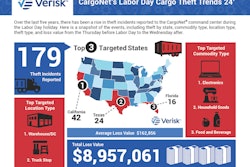Managing fleet fuel expenses is crucial for optimizing operational costs and ensuring efficiency. To avoid overpaying for fleet fuel, operators need to adopt key strategies that address multiple aspects of fuel management. These include validating fleet fuel prices to ensure fair billing, meticulously tracking fuel use by the gallon to prepare a more accurate budget, and monitoring usage to detect and prevent theft. Leveraging advanced technology can further enhance these efforts by enabling data-driven decision-making. This article provides tips on how to implement these strategies for reducing fuel expenses and improving fleet fuel management.
Perform fuel price validation
Mistakes in fuel invoices are not unusual. A negotiated deal, no matter how advantageous, loses its value if not executed properly. Fuel price validation involves comparing the monthly charges you incur with the terms of your negotiated agreement. Regardless of your choice of fueling methods—bulk, mobile or fleet card—price validation confirms the accuracy of your fuel charges as well as verifies associated costs, including taxes and fees.
Fuel price validation is a complex undertaking that involves numerous factors. For instance, fuel prices fluctuate persistently, taxes differ across states and fuel purchases are likely to be made from various locations. This labor-intensive task requires auditing invoices and verifying all line items, not just the fuel price. However, if you neglect to scrutinize your fuel invoices, you might find yourself paying significantly more than what you initially contracted.
Implementing an effective fuel price validation process involves several steps:
Understand your fuel contract. The first step is to thoroughly understand your fuel contract. Know the terms and conditions, the pricing structure and any additional fees that may apply. This will serve as the basis for your validation process.
Establish a baseline. Decide with the fuel provider on an index, such as the Oil Price Information Service (OPIS), to establish a baseline for prices. This will help you compare what you are being charged against the market rate.
Audit your invoices. It is essential to conduct frequent audits of your fuel invoices. Examine all line items, not simply the fuel price. Identify any inconsistencies between the invoice and your contract. Ensure that the invoiced price aligns with the agreed-upon index, inclusive of the negotiated margin, freight charges and relevant taxes.
Scrutinize any extra fees on the invoice to confirm they are in line with your negotiated contract. If any charges appear out of the ordinary, you need to trace their source and verify their legitimacy. Even small discrepancies can add up over time and signal a larger problem.
When validating fuel card invoices, check that the pricing components on the invoice match the terms agreed upon in the contract. If you are in charge of a large fleet, expect to scrutinize thousands of transactions each month.
For cost-plus fuel card invoice validation, make sure the charge is the rack price based on the OPIS index, not the retail price. Additionally, confirm the accuracy of tax charges and any extra freight fees.
In the case of retail-minus arrangements, your drivers use the fuel card to cover the displayed pump price, taxes and retail margin. Review each invoice to make sure you are receiving the agreed-upon discount per gallon from the various retail locations. Your audit should also involve monitoring retail prices, purchase transactions and odometer readings. Avoid having your drivers search for the lowest retail prices, as the additional travel could negate any savings.
Review your process. As your fleet grows or changes, your validation process may need to be adjusted. Regularly review and update your process to ensure its ongoing effectiveness.
Train your team. Clearly communicate the importance of the fuel price validation process and what is expected from each team member, such as their specific roles and responsibilities in the process. This includes drivers, who can play a crucial role in identifying and reporting any issues.
Track fuel usage by the gallon
When preparing a fleet fuel budget, forecasting the gallons of fuel consumption across your operations over a specific timeframe is a more reliable measure than the cost of fuel. While it’s important to monitor fuel prices, they shouldn’t be the primary factor in your budgeting process due to their frequent fluctuations—sometimes even multiple times within a day. This makes fuel prices an unstable foundation for budget planning. Fuel prices are not only influenced by an unpredictable market but also differ based on geographical location. Additionally, each state imposes its own fuel tax structure.
Instead, focus on identifying patterns in your monthly fuel purchases by gallon per location. If your fleet uses different types of fuel, such as diesel and regular gas, evaluate them individually. After establishing your fuel consumption in gallons, review your historical costs, including any negotiated pricing. Then project future prices assuming your fuel consumption remains unchanged. If you anticipate growth, like adding more trucks or introducing new routes, you’ll need to incorporate an estimate of the additional fuel consumption into your calculations.
Monitor for fuel theft
Fuel theft is a prevalent issue among commercial fleets. Accurate fuel consumption data is your best tool to spot potential fuel theft and other questionable practices. By diligently monitoring and evaluating your fuel data, you can prevent fuel theft from escalating.
Maintain comprehensive records and cross-verify fuel card purchases with the odometer readings of each driver. If there’s a discrepancy, it warrants further investigation. Ensure you have a discussion with the driver in question, which helps in setting an appropriate standard in your organization. When drivers are aware that their activities are being monitored, they are less likely to engage in misconduct. Lastly, dissuade drivers from exchanging fuel cards amongst themselves. This measure will help maintain accurate records and facilitate the detection of irregularities that could suggest potential fraud.
In addition, you can negotiate a fuel card program that sets parameters on each card to control possible theft, for example the amount of fuel that can be purchased each day, time of day the cards can be used, PIN numbers and odometer reading entry.
Ensure accuracy via technology
Keeping track of all of your fleet fuel invoices and purchases is a daunting task. Manual processes are prone to errors and are time-consuming. Consider using fuel management software or services to automate the validation process, making it easier and more efficient to track purchases, consumption and odometer readings. They can also provide detailed reports and analytics to help you track your spending and better manage your fuel costs.
Sophisticated technological solutions can offer suggestions on the optimal locations to refuel your fleet, complete with exact GPS coordinates, and monitor when drivers use fuel vendors outside your network. These platforms can also supply data to compute vendor profit margins, aiding you in negotiating better deals with fuel vendors, eliminating accessorial fees, and determining your eligibility for tax refunds.
Data-centric fuel reports can provide you with the number of fuel transactions, price per gallon, total gallons purchased and overall expenditure across all your locations and fueling methods. Specialized tools can assist in comparing fueling methods to determine if your company would realize greater savings with over-the-road fueling or mobile fueling.
The effective management of fleet fuel costs is a key component in optimizing operational expenses and enhancing efficiency. To prevent overspending on fleet fuel, it’s imperative for operators to implement comprehensive fuel management strategies. These tactics should include the validation of fleet fuel prices for accurate billing, detailed tracking of fuel consumption for precise budgeting, and monitoring usage to deter and detect theft. The use of advanced technology can augment these strategies by facilitating data-based decisions.












